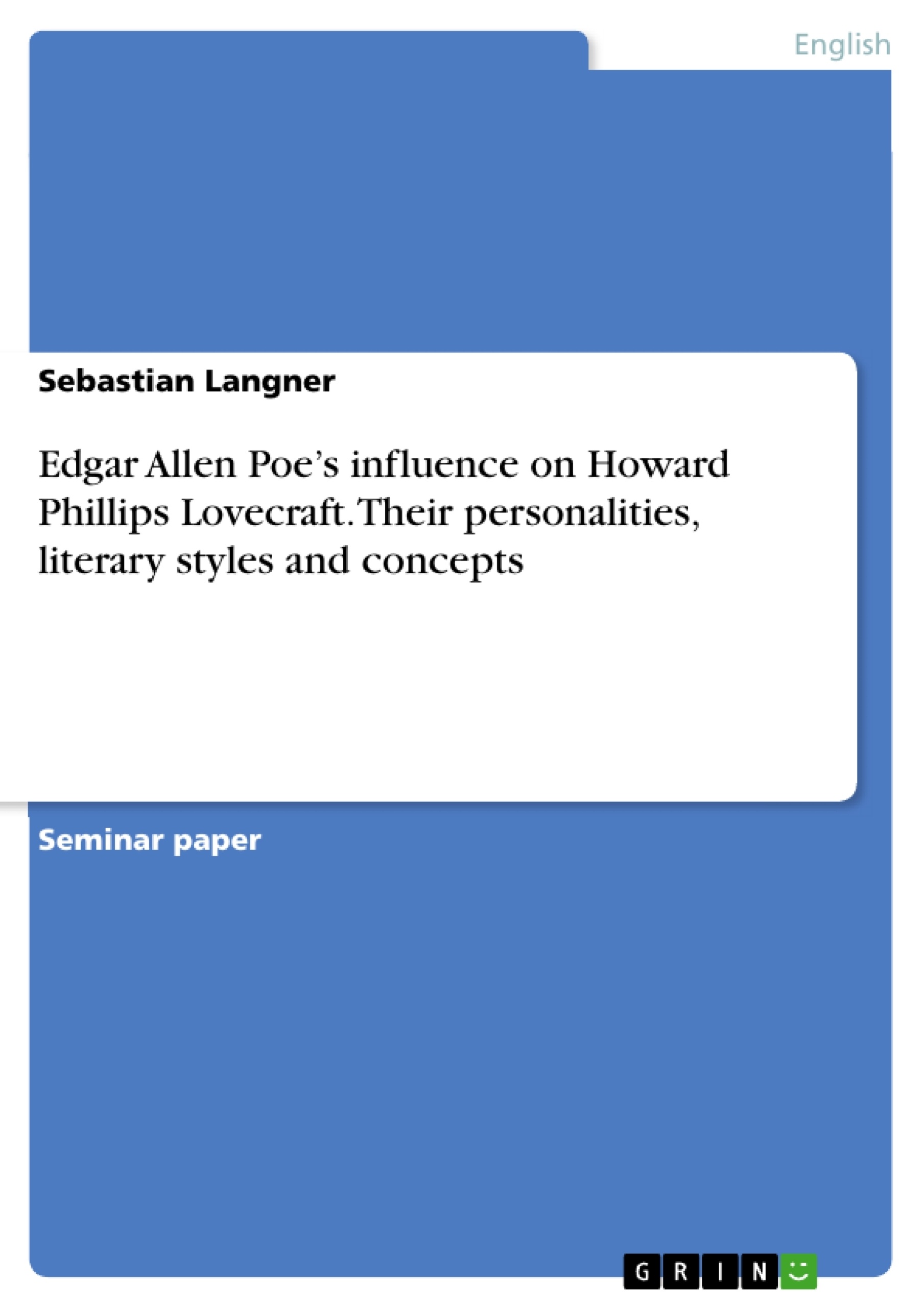The main purpose of this paper is to trace Edgar Allen Poe’s influence on H. P. Lovecraft, to prove coincidences or expose differences, whether it is of style, topic, literary concepts or biographical respectively personal similarities.
As Howard Phillips Lovecraft’s life and work are less known than it is the case with Edgar Allen Poe, the paper is divided into two main parts, one of them exclusively dedicated to Lovecraft, the other one trying to draw the above mentioned comparison.
Table of Contents
- Preface
- Howard Phillips Lovecraft – An Introduction
- A Biographical Sketch
- Early Years
- Later Years
- Teutonic Aryan – In HPL's Behalf
- Calling forth Cthulhu – Lovecraft's Mythology
- The Necronomicon
- The Old Ones
- A Biographical Sketch
- H.P. Lovecraft and E.A. Poe
- Literary Concepts
- Literary Style
- The Outsider
- Biographical and Personal Similarities
- Synopsis
- Bibliography
Objectives and Key Themes
The paper aims to explore the influence of Edgar Allan Poe on Howard Phillips Lovecraft, examining their similarities and differences in style, themes, literary concepts, and biographical aspects.
- The influence of Poe on Lovecraft's literary style and themes
- Comparison of Lovecraft's and Poe's literary concepts and approaches
- Analysis of biographical and personal similarities between the two authors
- Exploration of Lovecraft's life and work in the context of his historical and cultural background
- The development of Lovecraft's unique mythology and its relation to Poe's work
Chapter Summaries
- Preface: This section introduces the reader to the core concept of fear of the unknown as the basis of Gothic and Horror literature and highlights Lovecraft's role as a master of the genre.
- Howard Phillips Lovecraft – An Introduction: This chapter provides a general overview of Lovecraft's life and work, focusing on his biographical sketch, including his early years, later years, and his controversial views on race.
- H.P. Lovecraft and E.A. Poe: This chapter sets out the paper's primary objective to investigate the influence of Poe on Lovecraft's work, comparing their styles, themes, concepts, and personal backgrounds.
- 2.1 A Biographical Sketch: This section provides a brief overview of Lovecraft's life, highlighting his early years and upbringing, his education, and the influence of his family and environment on his views and literary work.
- 2.1.1 Early Years: This section delves into Lovecraft's early life, his upbringing, and his exposure to books and literature from a young age. It explores his childhood interests, such as classic Greek and Roman mythology and medieval Islam, and how these influenced his later work.
Keywords
This paper explores the influence of Edgar Allan Poe on Howard Phillips Lovecraft, focusing on themes such as fear, the unknown, the outsider, literary style, biographical and personal similarities, and the development of Lovecraft's unique mythology.
Frequently Asked Questions
What is the main focus of this research paper?
The paper investigates the literary influence of Edgar Allan Poe on the work and philosophy of Howard Phillips Lovecraft, highlighting stylistic and thematic parallels.
What are the key themes in H.P. Lovecraft's work discussed here?
Key themes include the fear of the unknown, cosmic horror, the concept of "the outsider," and Lovecraft's unique Cthulhu mythology.
Does the paper cover biographical similarities between Poe and Lovecraft?
Yes, it explores personal and biographical coincidences between the two authors that may have shaped their similar literary outlooks.
What is the significance of the "Necronomicon" in Lovecraft's work?
The "Necronomicon" is a central fictional grimoire in Lovecraft's mythology, used as a literary device to enhance the sense of ancient, forbidden knowledge.
How did Lovecraft's early years influence his writing style?
His early exposure to classic Greek and Roman mythology, as well as medieval literature, laid the foundation for his later development of cosmic horror.
Does the paper address Lovecraft's controversial views?
Yes, the biographical sketch includes a section discussing Lovecraft's controversial views on race and his "Teutonic Aryan" beliefs.
- Citation du texte
- Sebastian Langner (Auteur), 2007, Edgar Allen Poe’s influence on Howard Phillips Lovecraft. Their personalities, literary styles and concepts, Munich, GRIN Verlag, https://www.grin.com/document/281411



